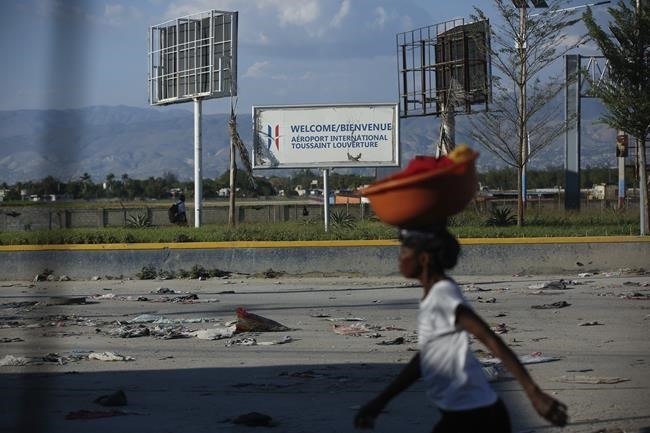PORT-AU-PRINCE, Haiti (AP) — Heavily armed gangs tried to seize control of Haiti’s main international airport on Monday, exchanging gunfire with police and soldiers in the latest attack on key government sites in an explosion of violence that includes a mass escape from the country’s two biggest prisons.
The Toussaint Louverture International Airport was closed when the attack occurred, with no planes operating and no passengers on site.
Associated Press journalists saw an armored truck on the tarmac shooting at gangs to try and prevent them from entering airport grounds as scores of employees and other workers fled from whizzing bullets.
It is the biggest attack on the airport in Haiti’s history.
Last week, the airport was struck briefly by bullets amid ongoing gang attacks, but gangs did not enter the airport nor seize control of it.
The attack occurred just hours after authorities in Haiti ordered a nighttime curfew following violence in which armed gang members overran the two biggest prisons and freed thousands of inmates over the weekend.
“The secretary-general is deeply concerned by the rapidly deteriorating security situation in Port-au-Prince, where armed gangs have intensified their attacks on critical infrastructure over the weekend,” said U.N. spokesman Stephane Dujarric.
A 72-hour state of emergency began Sunday night. The government said it would try to track down the escaped inmates, including from a penitentiary were the vast majority were in pre-trial detention, with some accused of slayings, kidnappings and other crimes.
“The police were ordered to use all legal means at their disposal to enforce the curfew and apprehend all offenders,” said a statement from Finance Minister Patrick Boivert, the acting prime minister.
Gangs already were estimated to control up to 80% of Port-au-Prince, the capital. They are increasingly coordinating their actions and choosing once unthinkable targets like the Central Bank.
Prime Minister Ariel Henry traveled to Kenya last week to try to salvage support for a United Nations-backed security force to help stabilize Haiti in its conflict with the increasingly powerful crime groups.
Dujarric said the secretary-general stressed the need for urgent action, especially in providing financial support for the mission, “to address the pressing security requirements of the Haitian people and prevent the country from plunging further into chaos.”
Haiti’s National Police has roughly 9,000 officers to provide security for more than 11 million people, according to the U.N. They are routinely overwhelmed and outgunned.
The deadly weekend marked a new low in Haiti's downward spiral of violence. At least nine people had been killed since Thursday — four of them police officers — as gangs stepped up coordinated attacks on state institutions in Port-au-Prince, including the international airport and national soccer stadium.
But the attack on the National Penitentiary late Saturday shocked Haitians who are accustomed to living under the constant threat of violence.
All but 98 of the 3,798 inmates being held at the penitentiary escaped, according to the Office of Citizen Protection. Meanwhile, at the Croix-des-Bouquets prison, 1,033 escaped, including 298 convicts.
The office said late Monday that it was seriously concerned about the safety of judges, prosecutors, victims, attorneys and others following the mass escape.
It added that it “deplored and condemned the policy of nonchalance” demonstrated by government officials amid the attacks.
Following the raid at the penitentiary, three bodies with gunshot wounds lay at the prison entrance Sunday.
In another neighborhood, the bloodied corpses of two men with their hands tied behind the backs lay face down as residents walked past roadblocks set up with burning tires.
Among the few dozen people who chose to stay in prison are 18 former Colombian soldiers accused of working as mercenaries in the July 2021 assassination of Haitian President Jovenel Moïse.
“Please, please help us,” one of the men, Francisco Uribe, said in a message widely shared on social media. "They are massacring people indiscriminately inside the cells.”
Colombia's foreign ministry has called on Haiti to provide “special protection” for the men.
A second Port-au-Prince prison containing around 1,400 inmates also was overrun.
Gunfire was reported in several neighborhoods in the capital. Internet service for many residents was down on Sunday as Haiti’s top mobile network said a fiber optic cable connection was slashed during the rampage.
After gangs opened fire at Haiti's international airport last week, the U.S. Embassy said it was halting all official travel to the country. On Sunday night, it urged all American citizens to depart as soon as possible.
The Biden administration, which has refused to commit troops to any multinational force for Haiti while offering money and logistical support, said it was monitoring the rapidly deteriorating security situation with grave concern.
The surge in attacks follows violent protests that turned deadlier in recent days as the prime minister went to Kenya seeking to move ahead on the proposed U.N.-backed security mission to be led by that East African country.
Henry took over as prime minister following Moise's assassination and has postponed plans to hold parliamentary and presidential elections, which haven’t happened in almost a decade.
Jimmy Chérizier, a former elite police officer known as Barbecue who now runs a gang federation, has claimed responsibility for the surge in attacks. He said the goal is to capture Haiti’s police chief and government ministers and prevent Henry’s return.
The prime minister, a neurosurgeon, has shrugged off calls for him to resign and didn’t comment when asked if he felt it was safe to come home.
___
Associated Press writers Joshua Goodman in Miami and Dánica Coto in San Juan, Puerto Rico, contributed to this report.
___
Follow AP's coverage at https://apnews.com/hub/latin-america
Evens Sanon And Pierre-richard Luxama, The Associated Press




